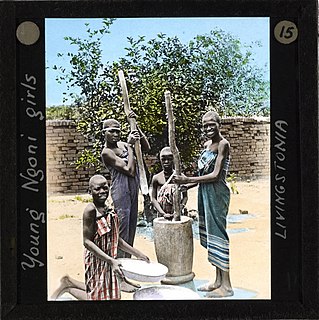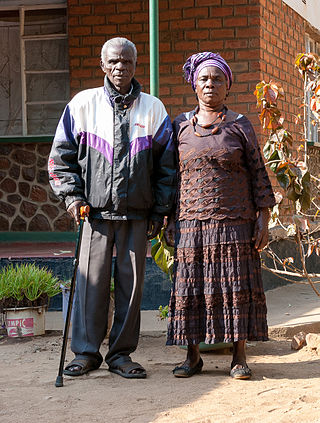This is a list of rulers of the Ngoni dynasty.
This is a list of rulers of the Ngoni dynasty.
Jere Dynasty (Qeko dynasty) (Ngoni Dynasty)
| Term | Incumbent | Notes |
|---|---|---|
| Inkosi ya makosi (Paramount Chief) | ||
| 1840 to 1848 | Zwangendaba a Hlatshwayo, Inkosi ya makosi | |
| 1848 to 1850 | Ntabeni, Regent | |
| 1850 to 1854 | Mgayi, Regent | |
| 1854 to 1857 | Gwaza Jere, Regent | |
| 1857 to 1891 | Mmbelwa I, Inkosi ya makosi | |
| 1891 to 1896 | Mwamba, Regent | |
| 1896 to 1915 | Cimtunga, Inkosi ya makosi | |
| 1915 to 1928 | Interregnum | |
| 1928 to 1959 | Mmbelwa II, Inkosi ya makosi | |
| 1958 to 1984 | Mmbelwa III, Inkosi ya makosi | |
| 1984 to 2013 | Mmbelwa IV, Inkosi ya makosi | |
| 2014 to 2017 | Mperella I, Inkosi ya makosi | |
| 2017 to present | Mperella II, Inkosi ya makosi | |
The history of Malawi covers the area of present-day Malawi. The region was once part of the Maravi Empire. In colonial times, the territory was ruled by the British, under whose control it was known first as British Central Africa and later Nyasaland. It becomes part of the Federation of Rhodesia and Nyasaland. The country achieved full independence, as Malawi, in 1964. After independence, Malawi was ruled as a one-party state under Hastings Banda until 1994.
Year 1352 (MCCCLII) was a leap year starting on Sunday of the Julian calendar.
The Nguni languages are a group of Bantu languages spoken in southern Africa by the Nguni people. Nguni languages include Xhosa, Hlubi, Zulu, Ndebele, and Swati. The appellation "Nguni" derives from the Nguni cattle type. Ngoni is an older, or a shifted, variant.

The Tumbuka is a Bantu ethnic group found in Malawi, Zambia and Tanzania. Tumbuka is classified as a part of the Bantu language family, and with origins in a geographic region between the Dwangwa River to the south, the North Rukuru River to the north, Lake Malawi to the east, and the Luangwa River. They are found in the valleys near the rivers, lake as well as the highlands of Nyika Plateau, where they are frequently referred to as Henga although this is strictly speaking the name of a subdivision.
Ngoni may refer to:

Ntcheu is a district in the Central Region of Malawi. It borders with the country of Mozambique. The district headquarters is Ntcheu, known as BOMA in the local language, but is most commonly called Mphate. It is run by Yeneya, the village headman. The district covers an area of 3,424 km.² and has a population of 659,608 people according to the 2018 Malawi Population and Housing Census. The Ntcheu district lies around halfway between Malawi's majors cities of Blantyre and Lilongwe - the capital city.

The Ngoni people are an ethnic group living in the present-day Southern African countries of Malawi, Mozambique, Tanzania, Zimbabwe, and Zambia. The Ngoni trace their origins to the Nguni and Zulu people of kwaZulu-Natal in South Africa. The displacement of the Nguni people in the great scattering following the Zulu wars had repercussions in social reorganization as far north as Malawi and Zambia.
The Tonga are an ethnic group living in northern Malawi on the shores of Lake Malawi in Nkhata Bay and northern part of Nkhotakota. Their language and Tonga people of Zambia and Zimbabwe belong to different branches of the Bantu family.
The Sangu, at times called Rori, is an ethnic and group based in the Usangu Plain of Chunya District of Mbeya Region, Tanzania. By 1907, their numbers were thought to be about 30,000. In 1987 their population was estimated to number 75,000.

Sir Alfred Sharpe was Commissioner and Consul-General for the British Central Africa Protectorate and first Governor of Nyasaland.

The ngoni is a traditional West African string instrument. Its body is made of wood or calabash with dried animal skin head stretched over it. The ngoni, which can produce fast melodies, appears to be closely related to the akonting and the xalam. This is called a jeli ngoni as it is played by griots at celebrations and special occasions in traditional songs called fasas in Mandingo. Another larger type, believed to have originated among the donso is called the donso ngoni. This is still largely reserved for ceremonial purposes. The donso ngoni, or "hunter's harp," has six strings. It is often accompanies singing along with the karagnan, a serrated metal tube scraped with a metal stick. The donso ngoni was mentioned by Richard Jobson in the 1620s, describing it as the most commonly used instrument in the Gambia. He described it as an instrument with a great gourd for a belly at the bottom of a long neck with six strings.
Inyandezulu Inkosi Yamakhosi Mphezeni KaZwangendaba is the King of the Ngoni people of Zambia's Eastern Province, East Africa and Malawi's Mchinji district. He is from the lineage of Prince Jele KaMfeka of the Ncwangeni Nguni family. His mother was Queen Soseya Nxumalo of the Ndwandwe royal house. Both his mother and her elder sister, Queen Loziwawa, were nieces of King Zwide.

Bassekou Kouyate is a musician from Mali. His band is known as Ngoni ba.
Ngoni Methukhela Makusha is a Zimbabwean sprinter. He finished sixth in the 100 metres at the 2018 African Championships. In addition, he represented his country at the 2019 World Relays.He is the 2018 Southern region Championships champion in the 100m and 200m He is a bronze medalist in the 4×100m Relay held in Mauritius 2022
Hehe, also known by its native name Kihehe, is a Bantu language that is spoken by the Hehe people of the Iringa region of Tanzania, lying south of the Great Ruaha River. It was reported to have "Ngoni" features, that is, words of a Zulu-like language introduced when conquered by a Nguni or Zulu-like people in the early 19th century. However, other "Ngoni" speeches seem to have lost most of these distinctive features over the past 150-odd years, the language more resembling those of the neighbouring peoples. In the 1970s, it was estimated that 190,000 people spoke Hehe. There has been some Bible translation. Hehe may be mutually intelligible with Bena.
Matengo is a Bantu language of Tanzania. Speakers are mostly monolingual, and neighboring languages are not intelligible.
Ngoni is a Bantu language of Zambia, Tanzania, and Mozambique. There is a 'hard break' across the Tanzanian–Mozambican border, with marginal mutual intelligibility. It is one of several languages of the Ngoni people, who descend from the Nguni people of southern Africa, and the language is a member of the Nguni subgroup, with the variety spoken in Malawi sometimes referred to as a dialect of Zulu. Other languages spoken by the Ngoni may also be referred to as "Chingoni"; many Ngoni in Malawi, for instance, speak Chewa, and other Ngoni speak Tumbuka or Nsenga.

The Chikulamayembe are a dynasty of kings established among the Tumbuka people in the Nkhamanga-Henga area of Northern Malawi. The Chikulamayembe originally ruled from around 1805, becoming weaker from the 1830s and losing power by the 1870s and their dynasty was re-established in 1907.

Inkosi ya Makosi Gomani II was born Zitonga at Chipiri in present-day Mozambique. His mother was naNgondo, junior wife to Gomani I, also known as Chatamthumba.